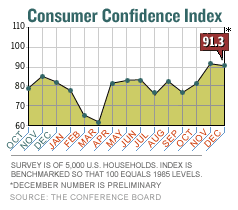NEW YORK (CNN/Money) - Consumer confidence fell in December, a research group said Tuesday, missing Wall Street forecasts and raising concerns that the job market's recovery may be slower than some economists had hoped.
The Conference Board, a business research group based in New York, said its closely watched index of consumer confidence fell to 91.3 from a revised 92.5 in November.
Economists, on average, expected the confidence index, based on a survey of 5,000 households, to rise to 91.8 from the originally reported 91.7, according to Briefing.com.

Though the index was lower than expected, it was still the second-highest level since 93.7 in September 2002 and significantly higher than the measure's March nadir of 61.4.
"It's not a big drop," said Gary Thayer, chief economist at AG Edwards & Sons in St. Louis. "It's reflecting the fact that the economy has improved this year, but not enough that consumers are convinced things are sufficiently better."
The survey's "expectations" index, measuring consumers' expectations for the future, rose to 102.9 from 100.1, but the "present situation" index fell to 73.9 from 81.
Separately, the National Association of Realtors said sales of previously owned homes, the biggest share of the housing market, shrank in November more than analysts had expected, and the National Association of Purchasing Management-Chicago said its closely watched index of regional manufacturing activity was lower than expected in December.
The trifecta of disappointing economic news helped sink U.S. stock prices in early trading. Treasury bond prices erased earlier losses.
Labor market still struggling
Confidence is watched closely by policy makers and analysts, since consumer spending fuels more than two-thirds of the nation's economy.
Of course, consumers don't always spend the way they feel -- confidence plunged following the Sept. 11, 2001, terror attacks, but consumers managed to keep spending, rushing to buy new automobiles at zero-percent financing.
Still, a weak job market has slowed down wage and salary growth, which is critical to consumer spending. Non-farm payrolls are still 2.4 million jobs smaller than they were in February 2001, before the latest recession began, marking the longest such stretch of payroll pain since World War II.
Tax-rebate checks, along with the proceeds of a wave of late-summer cash-out mortgage refinancing, drove consumer spending to dizzying heights in the third quarter. That helped push gross domestic product (GDP), the broadest measure of the economy, to an 8.2 percent annualized growth rate, the best in nearly 20 years.
Economists hope the third quarter's growth will push the economy into higher gear in future quarters, creating more jobs and accelerating wage and salary growth to support the economy in the longer term.
Signs of a better job market raised confidence in November, but hopes dimmed in December, as blockbuster job growth is still more of a promise than a reality.
Structural changes seen
Some economists -- including researchers at the New York Federal Reserve -- believe blockbuster job growth will be hindered by structural changes in the U.S. economy, including technological improvements and a trend toward outsourcing work overseas, where labor is cheaper.
"We're going to continue to see this throughout 2004, this sideways movement in consumer confidence, simply because we're going to see a very choppy recovery in the labor market, and employment is the single most important influence on consumer attitudes," said Richard Yamarone, chief economist at Argus Research.
Consumers' view of the labor market is still fairly confused, according to Tuesday's Conference Board data. On the one hand, the percentage of survey respondents expecting an improvement in the job market six months from now rose to 26.8 percent from 24.5.
But the percentage of respondents expecting things to get worse in the next six months also rose, to 8.1 percent from 7.2.
And the percentage of survey respondents saying jobs are "hard to get" rose to 32.6 percent, still near the highest level in a decade, from 29.6 percent in November.
"None of [the labor-market indicators] are dreadful, but the talk is the key -- there's so much talk about outsourcing to China and other places and that there will be no jobs left," said Delos Smith, senior economist at the Conference Board. "People realize the economic system is changing, even if they can't put their finger on it."

|

